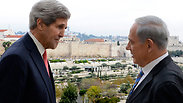
Kerry: Netanyahu does not want NATO in West Bank
In Washington Post interview Kerry points to new issue facing peace talks: Abbas wants IDF out in five years with NATO securing West Bank, while Netanyahu rejects this option. Kerry: Third party option being worked on by parties
In a new interview, the US secretary of state revealed additional differences threatening US-brokered peace talks.
Speaking to the Washington Post's David Ignatius, John Kerry said that Israeli Prime Minister Benjamin Netanyahu was opposed the idea of NATO – as opposed to IDF – forces securing the West Bank, as Palestinian President Mahmoud Abbas had suggested.
Related stories:
- US lauds Lieberman's support of Kerry
- PM to Abbas: It's absurd that we'll recognize you without you recognizing us
- Kerry returns to Israel; wants to 'strike while iron hot'
Last week Abbas told the New York Times he would accept a NATO force presence in the West Bank, which would remain in place after a five year withdrawal of IDF forces.
“Netanyahu has made it clear he doesn’t want NATO,” Kerry said, but noted that the possibility of a third-party force “is something for the parties to work out."
Kerry began his interview with Ignatius by explaining that part of his strategy for the success of peace talks was allowing both Netanyahu and Abbas the chance to dissent against contested issues.
According to Kerry, this is “the only way for them to politically be able to keep the negotiations moving… For them as leaders to be able to embrace an endgame, they need to have the right to be able to have some objection.”
Kerry also echoed his frustration at the anger at what he claims was a statement “taken out of context.” Last week, Kerry claimed that if peace talks were to fail, then Israel could face a wave of economic sanctions. Israeli critics took the statement as a threat, while Kerry claims he was only stating his opinion based on current international trends.
Kerry told Ignatius that “There are those who do not want a two-state solution, who don’t believe in it. There are those who don’t want to stop settling certain parts of the region.”
When asked if he really believes a peaceful resolution to the conflict can be brought about, Kerry diplomatically responded “Everybody understands that it’s going to take some period of time for a transition. That’s why it is phased… What is critical, I think, is to give people a sense that there can be an end of the conflict and an end of claims, that there is a framework within which it is all contained.”
Regarding Iran, Kerry said “President Obama and I both share the belief that thinking about and exploring a regional security component to this overall approach to peace is very important, but — and I underscore a great, huge ‘but’ — we are not engaged in that discussion with Iran at this point in time, nor will we be until we resolve the nuclear file."
In a possible bid to quell Saudi fears at America's newfound outreach to its regional advisory Iran, Kerry said that Saudi King Abdullah mentioned “a potential new security arrangement for the region” in his 2002 Arab Peace Initiative.
A document that adumbrates a peace agreement between Israel and the Palestinians and also mentions “comprehensive peace” and “security for all the states of the region.”
When asked if he was trying to make history and follow in the footsteps of his predecessors, Kerry said “I’m not doing this in some model… I mean, it can require a push, it can require stepping back. It can require drama, and it can require silence… It’s my job. I’m secretary of state.”










